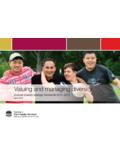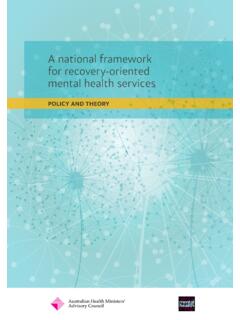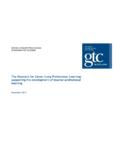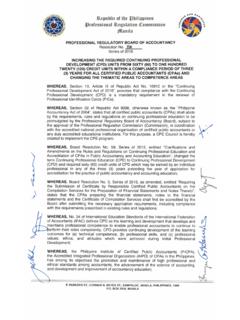Transcription of Awareness Cultural Tool - MHiMA
1 Cultural Awareness tool UNDERSTANDING. C U LT U R A L D I V E R S I T Y. I N M E N TA L H E A LT H. for additional copies contact: Multicultural Mental Health Australia Locked Bag 7118. Parramatta BC 2150. Tel: + 61 2 9840 3333. Fax: + 61 2 9840 3388. 2002 West Australian Transcultural Mental Health Centre, The Royal Australian College of General Practitioners WA Research Unit, Commonwealth Department of Health and Ageing and Multicultural Mental Health Australia. This work is copyright. It may be reproduced in whole or in part for study or training purposes subject to the inclusion of an acknowledgement of the source and no commercial usage or sale.
2 Reproduction of purposes other than those indicated requires permission. ISBN 0 9581735 0 8. This manual was funded by the Commonwealth Department of Health and Ageing under the National Mental Health Strategy through the Australian Transcultural Mental Health Network (now Multicultural Mental Health Australia). CONTENTS. Acknowledgements .4. Foreword .5. About the tool .7. What is Mental Illness ? .9. The Influence of Culture .11. Mental Health and Mental Illness Among Culturally Diverse Communities.
3 15. Beliefs About the Causes of Mental Illness .17. How Cultural Diversity Affects the Management of Mental Illness .21. Exploring Explanatory Models .23. Issues to consider during a Cross- Cultural Clinical Consultation .27. Using the Cultural Awareness tool .29. Cultural Formulation of a Psychiatric Diagnosis: A Clinical Case Study .33. Cultural Competence in Mental Health Care .53. Communicating Effectively .55. Using Interpreters .59. Accessing Specialist Service Providers and Further Resources .63.
4 References .65. ACKNOWLEDGEMENTS. This resource was funded by a grant from the National Mental Health Strategy administered by the Commonwealth Department of Health and Ageing through the Australian Transcultural Mental Health Network, now Multicultural Mental Health Australia. Chief Investigators: Dr Bernadette Wright, Senior Clinical Psychologist, West Australian Transcultural Mental Health Centre; Adjunct Senior Lecturer, Faculty of Communications, Health & Science, Edith Cowan University, Western Australia Dr Rosie Rooney, Senior Lecturer, School of Psychology, Curtin University of Technology Dr Pradeep Jayasuriya, Director, Royal Australian College of General Practitioners WA Research Unit Research Officers: Ms Elizabeth Seah Dr Farida Tilbury Authors: Seah E, Tilbury F, Wright B, Rooney R, Jayasuriya P.
5 Advisory Committee: Dr Geetha Mendis, Psychiatrist Dr Tony Barr, General Practitioner Ms Sofie Jasinski, Ethnic Disability Advocacy Centre Ms Maria Gaglia, Consumer Representative Mr Michael O'Hara, GlaxoSmithKline Dr Duane Pennebaker, Centre for Mental Health Services Research Inc. Special thanks to those who assisted in reviewing the various drafts of this resource..4. FOREWORD. In addressing the problems faced by people from Culturally and Linguistically Diverse (CALD) backgrounds, health service providers are encouraged to have a culturally-appropriate' or culturally-sensitive' approach to the assessment, diagnosis and management of clients.
6 However, despite this imperative, strategies directed at altering the practices of the service providers in an enduring manner have largely been ineffective. To facilitate improvement in the quality of care of service providers, development of the Cultural Awareness tool (CAT) was conceptualised. This tool , derived from the successful Checklists for Cultural Assessment', produced by the Queensland Health Department, is aimed at providing practitioners with general guidance in how to manage clients with mental illness in a more culturally-aware manner.
7 In its entirety, the tool would guide practitioners in eliciting their CALD client's understanding of the presenting problem, whilst conducting such an investigation in a culturally-sensitive manner. Following a comprehensive consultation phase, this tool was piloted among a diverse range of health and mental health practitioners. It is therefore designed for use by a variety of clinicians including Psychiatrists, Clinical Psychologists, General Practitioners, Social Workers, Mental Health Nurses and Occupational Therapists.
8 We acknowledge that practitioners may themselves be from CALD. backgrounds, but hope that the material is still useful in providing a general understanding of the influences of culture..5..6. ABOUT THE tool . The tool consists of a small booklet and accompanying hand-held card. Although it does not attempt to provide comprehensive information on all aspects of culturally sensitive care, it is designed as a first step in developing Cultural competence. Based on usage of this tool , our hope is that health and mental health practitioners will further develop their own knowledge concerning culturally-sensitive care.
9 The pocket-size' card contains questions designed to elicit the client's explanatory model of their illness and medical encounter, and how the patient's Cultural background affects their health beliefs and behaviours. Background information regarding the rationale for using the card is provided in the booklet. A case study illustrates the ways in which culture affects all aspects of mental illness and care. A number of general points about issues that may be relevant for clients from CALD backgrounds are highlighted.
10 The booklet also includes general information on how to interact with a client from a different ethnic background, including the use of interpreters. These sections also provide information on the Translating and Interpreting Service. While it does stand alone, this tool may be used in conjunction with the culture- specific information available in the Culture and Health Care file developed by the Multicultural Access Unit of the Health Department of Western Australia (orders can be placed on (08) 9400 9511).







